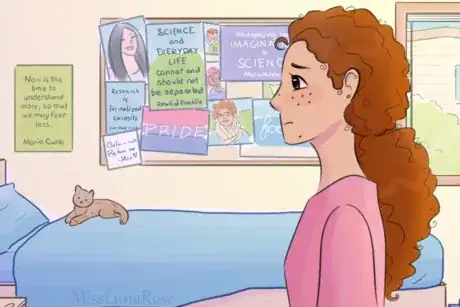This article was co-authored by Vernita Marsh, PhD. Dr. Vernita Marsh is a Licensed Clinical Psychologist and the CEO and Founder of Dr. Vernita Marsh & Associates and The Marsh Clinics®. With over 30 years of clinical psychology experience, she specializes in relationship therapy, grief counseling, family therapy, and intimate partner abuse counseling. Dr. Marsh offers consultation for therapists, coaches, and trainees of mental health. Dr. Marsh earned her PhD in Clinical Psychology from Michigan State University and completed both her postdoctoral and fellowship training at Harvard Medical School. She also has expertise in the area of Telehealth and has received Clinical Telehealth Health Provider Certification from Evergreen.
There are 7 references cited in this article, which can be found at the bottom of the page.
This article has been viewed 144,987 times.
It can be scary to know that your loved one is involved with a controlling or coercing partner. Abuse can be emotional, financial, sexual or physical and can include threats, isolation, and intimidation. If you see your loved one being abused, here is how to help them stay safe and make things better.
Steps
Discussing the Relationship
-
1Remember that you can't save your loved one. You are not responsible for them, and you cannot take control of their lives. You are not a savior or an expert. However, you can be a supportive presence in their lives.[1]
-
2Recognize that the initiative to leave needs to come from the victim. You may wish to sweep the victim away and keep them safe. Unfortunately, it probably won't work. Your loved one may feel powerless, and in order to make a lasting change, they need to empower themselves.[2]Advertisement
-
3Don't criticize the abuser in front of the victim. The victim may view you as an aggressor, and side with their abuser. Hating on the abuser, while thoroughly justified, will only alienate the victim.[3]
- If they see you as too biased, they may avoid coming to you with their problems. Try to stay polite, no matter how horrible the abuser is.
-
4Briefly ask how your loved one feels when the abuser acts controlling. Your goal isn't to impose an opinion upon them, but to encourage the victim to reflect on how they are being treated.[4]
- "Are you okay with him monitoring your texts?"
- "Does it bother you when she does that?"
- "How do you feel about him talking to you like that?"
-
5Express your feelings. Criticizing the abuser directly might alienate the victim, but framing it in terms of your feelings can make it more palatable. This helps your loved one consider the situation through your eyes.[5]
- "I'm worried about your safety."
- "It scares me to leave you home alone. I remember the bruises she gave you and I worry you'll get hurt again."
- "I've never seen you so upset, and it worries me."
-
6Don't intervene, no matter how much you want to. Jumping into an abusive dynamic is likely to get you hurt, risks alienating the victim, and probably won't help your loved one in the long run. Only confront the abuser if the victim asks you to, and if you personally feel that you are able to do so safely.[6]
- If you tell off the abuser, it may anger them. Unfortunately, they may take their anger out on the victim in private later. As tempting as it is, it may endanger the victim.
Helping Them Cope
The victim may not want to leave right away. Here is how to support them while they are still in the relationship (and while they are recovering).
-
1Offer specific help. Your loved one may not be in an emotional place to think about where they could use support. Suggest how you could be helpful—making meals, caring for children, researching their partner's behavior, et cetera.
-
2Encourage them to go out and spend time with friends or family. An abuse victim may become isolated over time, and you can help by inviting them out. Go out together, or invite them to a group thing. Contact with the outside world is helpful to their mental health, and they deserve to go out and have fun.
- An abuser may try to manipulate the situation to drive a wedge between the two of you. Don't let it work. Even if you have a fight or something, make sure they know they can still come to you.
-
3Give them some extra love and attention. Help the victim feel valued and loved. Abuse can hurt or destroy their self-esteem, so you can be helpful by building them up a little.[7]
- Mention the qualities you like most about them (resilience, wisdom, kindness, etc.).
- Do activities together (e.g. bowling, painting) that they are good at. Help them feel successful and competent.
- Ask them for advice about something.
- Help a woman feel pretty by complimenting her looks or dolling her up.
-
4Talk about a safety plan. If your loved one recognizes that there is a problem, you can help them come up with a plan if they feel unsafe. Write it down, or if they feel their abuser will find it, keep it verbal.[8]
-
5Suggest that they get expert advice. If your loved one asks for advice, this is a good sign. You can help a little, but you may feel overwhelmed and confused by the enormity of the problem. Don't be afraid to suggest that they see someone who is more qualified.[9] [10]
- For example, "Jess, I really want to help you, and this is such a difficult situation that I don't really know how. You deserve support, and I want you to get the help you need, which is why I think it might be good to talk to a counselor who specializes in this area. I could help you find someone, and I promise I'll still be here for you."
- If they say yes, look for a domestic violence expert or therapist (not a couples counselor).
-
6Offer options if your loved one expresses fear or a desire to leave. Place them in control—give them options, and let them choose what they feel is best for their situation. The empowerment of choosing will help give them strength to care for themselves.[11]
- "You sound really scared to go home tonight. Would you like to sleep over at my house?"
- "Would you like to call an abuse hotline? If you want, I could make the call for you, or I could stay with you while you call. I'd also be okay with going to the next room if you want privacy."
- "I know where the local shelter is. Would you like me to drive you there?"
- "Do you want me to help you find options?"
Treating the Victim Well
-
1Be patient. Reaching the point where your loved one is ready to leave may take longer than you want it to. Let them move at their own pace without pressure. Work on taking care of yourself and being supportive.
-
2
-
3Validate their feelings. Abuse stirs up many emotions, not all of which may make sense to you or seem "right." You don't have to understand. Many times, when people talk, they just want to feel that you care. Listen to them actively, and be empathetic regarding whatever they might be experiencing. Here are some useful, validating phrases to practice:
- "That sounds really difficult/frustrating/rough."
- "I see."
- "I'm so sorry to hear that."
- "I'm not surprised to hear that you feel that way, given everything you're going through."
- "You're allowed to be upset."
-
4Gently talk them out of blaming themselves. They may feel that it's their fault, that they're being ridiculous or irrational, or that they deserve to be abused. Remind them that their feelings are normal and it isn't their fault.
-
5Never blame them, judge them, or tell them how to feel. Avoid being judgmental, critical, or harsh. Your loved one is experiencing pain that you cannot understand, and it is belittling to tell them what to do or how to feel. You don't want them to transition from obeying an abuser to obeying you—you want them to gain the autonomy to choose for themselves.[13] [14]
- "You need to leave them" or "You should get help" are examples of telling them what to do. Even if you mean well, this is usually unhelpful.
-
6Respect the victim. Your loved one isn't being treated well, and they might forget that they deserve good treatment. You can help by respecting them and their autonomy, and treating them the way they deserve to be treated. Your kindness will gently remind them that they are worth more.
-
7Be in it for the long run. Even after the relationship is over, abuse leaves long-lasting effects. Continue being there for your loved one and helping them face their scars.
References
- ↑ https://www.joinonelove.org/learn/help_a_friend/
- ↑ https://foh.psc.gov/NYCU/domesticviolence2.asp
- ↑ https://foh.psc.gov/NYCU/domesticviolence2.asp
- ↑ https://www.psychologytoday.com/us/blog/presence-mind/201510/how-help-someone-in-abusive-relationship
- ↑ https://www.safehorizon.org/programs/supporting-someone-emotionally-abusive-relationship/
- ↑ https://foh.psc.gov/NYCU/domesticviolence2.asp
- ↑ https://www.psychologytoday.com/us/blog/presence-mind/201510/how-help-someone-in-abusive-relationship
- ↑ https://www.womenshealth.gov/relationships-and-safety/get-help/how-help-friend
- ↑ https://www.self.com/story/help-friend-abusive-relationship
- ↑ https://www.womenshealth.gov/relationships-and-safety/get-help/how-help-friend
- ↑ https://www.thehotline.org/2017/02/16/supporting-someone-returning-to-abusive-relationship/
- ↑ https://www.safehorizon.org/programs/supporting-someone-emotionally-abusive-relationship/
- ↑ https://www.joinonelove.org/learn/help_a_friend/
- ↑ https://www.safehorizon.org/programs/supporting-someone-emotionally-abusive-relationship/















































































